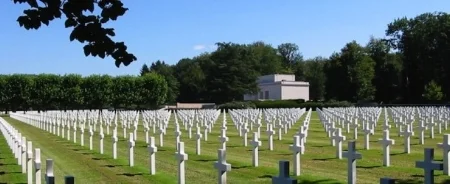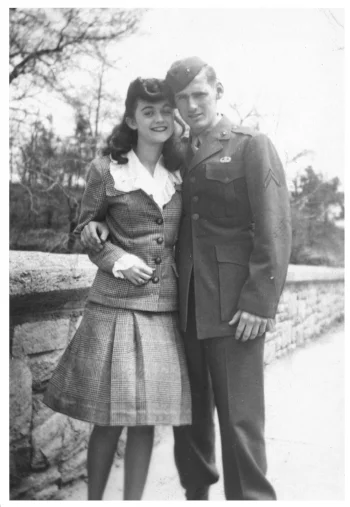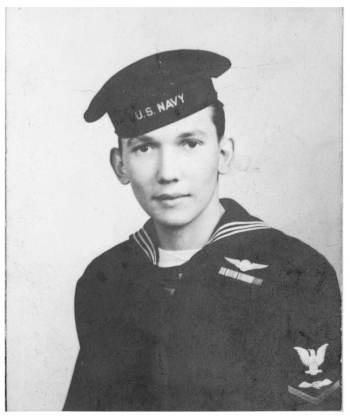Epinal American Cemetery and Memorial, Dinozé, France.
I had planned to feature a more common word—Obscurity—to make my point this week…but as I grew to understand what I wanted to say, a different, unusual word came to me: Necromancy. Necromancy is the act of communing with the dead. It has black-magic and witchcraft connotations—communing with the dead to tell the future. In Macbeth, for example, the weird sisters commune with the dead to give Macbeth warnings of his impending fate.
But I have been communing with the dead to understand the past, to bring the past out of obscurity. While working on Kay Square’s latest book, A Philadelphia Family Goes to War—due out on December 7—I’ve felt as if I’m communing with the dead…
My work began as editorial work, compiling 433 letters, understanding the cursive, organizing the dates, making sense of vague references. I began to research people, places, and things to make sense of 75-year-old facts. While much of the war is very well documented—battles, politicians, weapons and equipment—the real, regular people seem to be faded into obscurity.
I’ve learned in the letters about families and individuals who made the ultimate sacrifice…but their names never went far beyond the few days or weeks when they died. My father’s photo album from the war years shows several friends and family whose names I’d heard, whose pictures I’d seen, but whose lives are faded into obscurity.
That’s when the dead began to commune with me…necromancy. Sometimes it was information in the letters, or in enclosed news clippings, or in other old documentation that I tracked down; they told me the stories of brief lives and great sacrifice, of great holes created in families, and how the world quickly (and innocently) forgot and moved on.
The dead have told me about:
William Callen, circa 1942.
William Callen: A first cousin to my father, Bill married Eleanor Adams in June 1942; they lived in Camden, NJ and he worked at the New York Shipbuilding Company until he entered the Army in December 1942. He rose to the rank of sergeant in the 100th Division. During an assault on a German-held town in eastern France, he led his squadron’s attack on a machine gun emplacement and was killed in action, November 20, 1944. Originally buried in the Epinal American Cemetery, Dinozé in northeast France, his body was returned and interred June 18, 1948 in the Beverly National Cemetery, Beverly, NJ.
Albert & Alice Callen, May 20, 1942.
Albert F. Callen Jr.: Bill’s brother and a first cousin to my father, Al married Alice Marietta Keck in May 1942. As a Coxswain in the US Coast Guard, Al was wounded in Leyte, the Philippines and qualified for a medical discharge, April 11, 1945. But he requested permission to remain in action and was reassigned to Okinawa. While waiting for transport, he was crushed beneath an overturned truck and died April 29, 1945. Originally buried in the Tacloban Cemetery in the Philippines, his body was returned and interred June 18, 1948 next to his brother in the Beverly National Cemetery, Beverly, NJ.
Mary Costello and Francis P. Conlin Jr.
Francis P. Conlin Jr.: Frank was my uncle’s best friend growing up and was a good friend to (and admired by) my father. He enlisted in the Marine Corps at the age of 20 soon after Japan’s attack on Pearl Harbor and trained as a Marine paratrooper. In early 1944, the Marines disbanded their paratroopers…to Frank’s great disappointment. He transferred to the Fleet Marine Force (the guys who “hit the beaches”) and was sent into action in the Pacific in August. On March 10, 1945, Frank was killed in action on Iwo Jima at the age of 23.
Leo Strong in his formal service portrait, 1944.
Leo Strong: Leo was a neighborhood friend who corresponded regularly with the Pawleys. He served in the U.S. Navy as a gunner in a dive-bomber. While in training in Virginia in 1944, he met up with my father and “the Swabbie” and the Marine toured the town drinking and dancing with southern belles; that was the last time my father saw his friend. Seventeen months later, Leo was killed just after the war had ended when his plane crashed in a non-combat mission in the Pacific.
There are many other names and other photographs that I’ve yet to hear about…maybe the dead will continue to commune with me, to give up more secrets about the past, to help me pull brave, dear people out of obscurity through necromancy.




